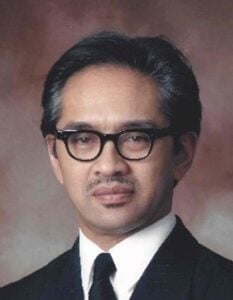Abstract
Far from proving their relevance, conflict situations around the world remind of the severe limitations of the existing global security governance. The United Nations Security Council paralysed by a deep geopolitical divide, unable to deliver on its Charter-mandated primary responsibility for the maintenance of international peace and security. Global economic and trade architectures, painstakingly built over decades, struggle to prove their relevance in the wake of unilateral imposition of tariffs. Headwinds against diplomacy and multilateralism are prevalent. A potential positive amidst the gloom – the recurring theme during the September 2024 UN Summit of the Future and the General Debate of the UN General Assembly on the need for reform – remains precisely that: a mere potential.
At this Lecture, Dr Marty Natalegawa will be addressing the following questions: What are the primary hurdles in promoting a more effective global response to threats to international peace and security? How can countries – outside those encamped within one of the competing geopolitical rivals – offer a common response in promoting a more representative and effective global security governance structure and working methods. How can climate conducive be promoted to alter the current negative dynamics; for diplomacy and dialogue to be placed front and centre in responding to security challenges? What lessons-learnt can countries in Southeast Asia offer to the wider international community on transforming trust-deficits to strategic trust?
About the Speaker
 Marty Natalegawa was appointed as Distinguished Visiting Fellow in the S. Rajaratnam School of International Studies on 1 July 2022.
Marty Natalegawa was appointed as Distinguished Visiting Fellow in the S. Rajaratnam School of International Studies on 1 July 2022.
Dr Natalegawa holds a D.Phil. from the Australian National University; an M.Phil. from University of Cambridge; and a BSc (Hons) from the London School of Economics.
Dr Natalegawa served as Foreign Minister of Indonesia (2009 – 2014). Previously, he served as Permanent Representative/Ambassador of Indonesia to the United Nations (UN); Ambassador to the UK and also to Ireland. Within the Ministry of Foreign Affairs of Indonesia, among others, he served as Director General for ASEAN Cooperation and Director for International Organisations.
Within ASEAN, he has been instrumental in pushing for the ASEAN Community and was an early advocate of an ASEAN role in the Indo-Pacific through the concept of “dynamic equilibrium”. Throughout, including as Foreign Minister, he actively promoted the management and resolution of potential conflicts in the region.
Within the context of the UN, he served, among others, as President of the Security Council in November 2007 and led Indonesia’s delegation at numerous multilateral negotiations, both within the UN and beyond. He was instrumental in securing Indonesia’s ratification of the Comprehensive Nuclear Test Ban Treaty (CTBT) in 2012.
He served in the UNSG’s High Level Panel on Global Response to Health Crises and as UN President of the General Assembly’s 72nd Session Team of External Advisors.
He is a member of the UN Secretary-General’s High Level Advisory Board on Mediation. He also served as a member of the UN Secretary-General’s Advisory Board on Disarmament and the Board of Trustees of the United Nations Institute for Disarmament Research.
He is also presently Asia Society Policy Institute Distinguished Fellow; a member of the International Academic Advisory Committee of the Oxford Centre for Islamic Studies; the Southeast Asia Advisory Board of the Centre for Strategic and International Studies (CSIS – Washington, D.C.); Global Advisory Committee of the Jeju Forum; and is also the Chairperson of the Asia Pacific Leaders Network (APLN) for nuclear non-proliferation and disarmament. In 2023 he initiated The Amity Circle which brings together individuals from the region with extensive policy experience at ministerial and head of government levels united in their support for diplomacy and dialogue as state crafts.
He is the author of “Does ASEAN Matter? A view from Within” (ISEAS Publishing – 2018).
Dr Natalegawa has been cited as “one of the most respected foreign policy and international security thinkers of his generation, both within Indonesia, in South-east Asia, and in the broader Asia-Pacific region”.



 Add to Google calendar
Add to Google calendar
 Add to Outlook calendar
Add to Outlook calendar
